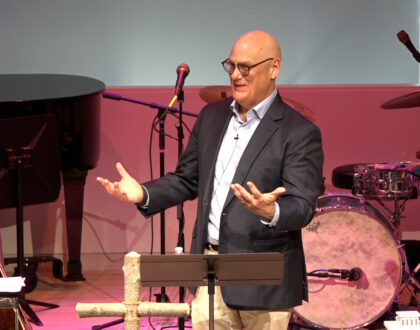Resentment, Gratitude, and Gaining Perspective
On Sunday, we focused on spiritual growth and formation and we talked about “Five Basic Spiritual Moves” that all of us should try to make. First, from fear to love. Second, from sorrow to joy. Third, from turmoil to peace. Fourth, from coldness to kindness. And fifth, from resentment to gratitude. Nouwen describes spiritual formation this way: “Spiritual formation prepares us for a life in which we move away from our fears, compulsions, resentments, and sorrows, to serve with joy and courage in the world, even when this leads us to places we would rather not go.” He says, “Spiritual formation helps us to see the face of God in the midst of a hardened world and in our own heart.” I want to focus on the fifth move, from “resentment to gratitude” because all human beings have to deal with resentment and anger.
Resentment makes spiritual formation very difficult. Resentment is closely tied to anger and envy but it usually revolves around an unhealthy preoccupation with something that has taken place in the past. Henri Nouwen defines resentment this way: “Resentment is a passion, a paralyzing set of complaints that makes us feel angry and frustrated with the people and institutions on which we have made ourselves dependent. And although resentment is less frightening and less visible than the violent outbursts of anger, it is no less destructive.” Every single one of us experiences resentment on some level because it’s a part of being human. There is a lot of pain, envy, heartache, fear, inequality, and hurt in this world. It’s hard to explain why some people suffer more than their fair share but pain and struggle is directly tied to the human condition. We cannot escape it. According to Nouwen, there is only one solution to dealing with resentment and that is gratitude, being thankful for the blessings we do have. In a world where everybody wants more, more, more, gratitude is becoming less common and very necessary. Nouwen makes these distinctions between resentment and gratitude: “Resentment blocks action; gratitude lets us move forward toward new possibilities. Resentment makes us cling to negative feelings; gratitude allows us to let go. Resentment makes us prisoners of our passions. Gratitude helps us to transcend our compulsions to follow our vocation. Resentment exhausts us by complicated jealousies and ambiguities, stirring up destructive desires for revenge. Gratitude takes our fatigue away and gives us new vitality and enthusiasm. Resentment entangles us in endless distractions, pulling us down to banal preoccupations. Gratitude anchors our deepest self beyond this world and allows us to be involved without losing ourselves.” (Nouwen Spiritual Formation) Simply stated, resentment is unhealthy. Resentment eats us up on the inside. Resentment keeps us from being at peace.
We are now entering the season of thanksgiving which is a time for all of us to intentionally practice gratitude. Perhaps the greatest downside of our materialistic culture is that we are so focused on what we don’t have that we don’t take the time to be grateful for what we do have. We can resent the fact that others have more and we feel like we deserve more. But perhaps it’s our perspective that needs to change. A story is told about a wealthy father who once took his privileged son for a trip to the country to show him how a poorer family lived. They spent a few days and nights on the farm of a poor family. On the ride home, he asked his son what he had learned about how poor people lived. The son responded: “I saw that we have one dog and they had four. We have a pool that reaches to the middle of our garden and they have a creek that has no end. We have imported lanterns in our garden and they have the stars at night. Our patio reaches to the front yard and they have the whole horizon. We have a small piece of land to live on and they have fields that go beyond our sight. We have servants who serve us, but they serve others. We buy our food, but they grow theirs. We have walls around our property to protect us, they have friends to protect them.” The boy’s father was speechless. Then the son quickly added, “Thanks Dad for showing me how poor we are.”
Recommended Posts

Loving God, Loving Nashville
April 24, 2024

Authenticity in a Social Media World
April 16, 2024

“Leveraging Our Love” – Jay Hutchens – April 14, 2024
April 14, 2024

